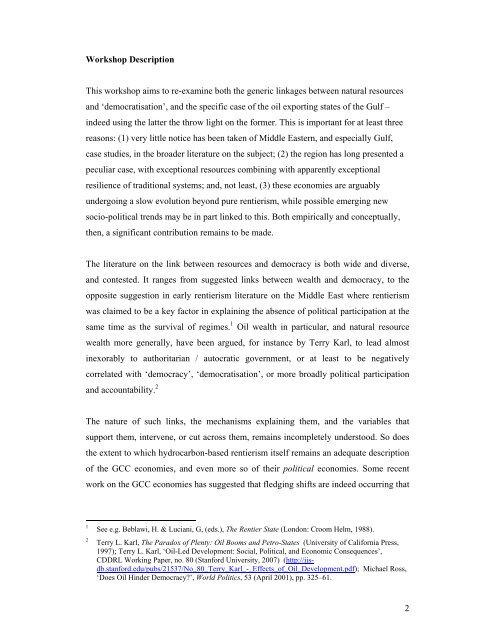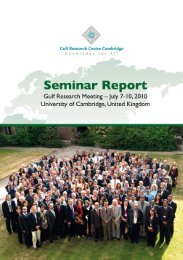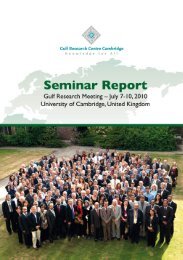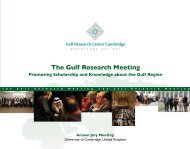Gulf Research Meeting 2010 - Gulf Africa Investment Conference
Gulf Research Meeting 2010 - Gulf Africa Investment Conference
Gulf Research Meeting 2010 - Gulf Africa Investment Conference
Create successful ePaper yourself
Turn your PDF publications into a flip-book with our unique Google optimized e-Paper software.
Workshop Description<br />
This workshop aims to re-examine both the generic linkages between natural resources<br />
and ‘democratisation’, and the specific case of the oil exporting states of the <strong>Gulf</strong> –<br />
indeed using the latter the throw light on the former. This is important for at least three<br />
reasons: (1) very little notice has been taken of Middle Eastern, and especially <strong>Gulf</strong>,<br />
case studies, in the broader literature on the subject; (2) the region has long presented a<br />
peculiar case, with exceptional resources combining with apparently exceptional<br />
resilience of traditional systems; and, not least, (3) these economies are arguably<br />
undergoing a slow evolution beyond pure rentierism, while possible emerging new<br />
socio-political trends may be in part linked to this. Both empirically and conceptually,<br />
then, a significant contribution remains to be made.<br />
The literature on the link between resources and democracy is both wide and diverse,<br />
and contested. It ranges from suggested links between wealth and democracy, to the<br />
opposite suggestion in early rentierism literature on the Middle East where rentierism<br />
was claimed to be a key factor in explaining the absence of political participation at the<br />
same time as the survival of regimes. 1 Oil wealth in particular, and natural resource<br />
wealth more generally, have been argued, for instance by Terry Karl, to lead almost<br />
inexorably to authoritarian / autocratic government, or at least to be negatively<br />
correlated with ‘democracy’, ‘democratisation’, or more broadly political participation<br />
and accountability. 2<br />
The nature of such links, the mechanisms explaining them, and the variables that<br />
support them, intervene, or cut across them, remains incompletely understood. So does<br />
the extent to which hydrocarbon-based rentierism itself remains an adequate description<br />
of the GCC economies, and even more so of their political economies. Some recent<br />
work on the GCC economies has suggested that fledging shifts are indeed occurring that<br />
1 See e.g. Beblawi, H. & Luciani, G, (eds.), The Rentier State (London: Croom Helm, 1988).<br />
2 Terry L. Karl, The Paradox of Plenty: Oil Booms and Petro-States (University of California Press,<br />
1997); Terry L. Karl, ‘Oil-Led Development: Social, Political, and Economic Consequences’,<br />
CDDRL Working Paper, no. 80 (Stanford University, 2007) (http://iisdb.stanford.edu/pubs/21537/No_80_Terry_Karl_-_Effects_of_Oil_Development.pdf);<br />
Michael Ross,<br />
‘Does Oil Hinder Democracy?’, World Politics, 53 (April 2001), pp. 325–61.<br />
2





